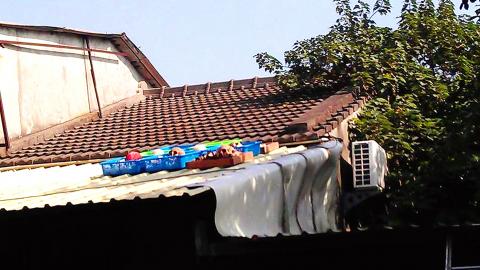Photographs of human skulls and bones laid out on a sunny rooftop in Lugang Township (鹿港), Changhua County, perplexed some netizens and frightened others as they were circulated on social media sites recently.
A Greater Taichung resident surnamed Lee (李) saw the skulls and bones sitting in plastic crates on the roof of a house when he visited Lugang last week. Intrigued by the sight, he photographed the bones and posted the pictures online, generating a tidal wave of commentary.
“This is just awesome. Human skulls are sunbathing on the roof,” one netizen wrote, while others said it was “unbelievable” that skeletal remains were on public display on a street.

Photo retaken by Chang Jui-chen, Taipei Times
Lee later found out that the crates belonged to bone collector (撿骨師) Huang Ming-hsien (黃名顯), who lives across the street.
Exhuming ancestral remains to clean, dry and rebury the skulls and bones is a tradition known as khioh-kut (撿骨) in Hoklo (commonly known as Taiwanese).
Huang said the custom enables the spirits of the deceased to rest in peace by helping the “fallen leaves return to the roots” (落葉歸根).
“In the past, the remains had to be dried out under the sun in the courtyard of the place where the deceased used to live. However, this is now done at a site chosen by the bone collector,” he said.
“Some collectors perform the ritual at graveyards, or in open fields. I do it on the roof of a relative’s house,” Huang added.
“Foreign tourists often come to take photographs of the bones,” he said, adding that his family had a billboard reading “Bone Aftercare” in English made to explain the practice to visitors.
“Tour guides also bring Japanese visitors here to have a look. We are quite used to the curiosity of outsiders,” he added.
Huang, 45, is part of the fourth generation of his family to make a career out of collecting bones.
Huang learned the trade by accompanying his father to work when he was young.
“I was a bit scared in the beginning, but I gradually built up courage until I was able to do it by myself,” he said.
“Bone collecting is an important service and its practitioners are helping others. As long as we remain morally righteous, maintain a good character and don’t do anything unethical, then we have nothing to fear from ghosts and evil spirits,” Huang said.
“Bones are just human skeletons. Everyone has a set, so what is there to be scared of?” he said.
Local residents say they are accustomed to the sight.
“It is just like drying clothing in the sun, no need to be alarmed,” a neighbor surnamed Chen (陳) said.
Some netizens agree, saying that as long as the practice does not jeopardize drivers’ or pedestrians’ safety, people should respect it.

The Executive Yuan yesterday announced that registration for a one-time universal NT$10,000 cash handout to help people in Taiwan survive US tariffs and inflation would start on Nov. 5, with payouts available as early as Nov. 12. Who is eligible for the handout? Registered Taiwanese nationals are eligible, including those born in Taiwan before April 30 next year with a birth certificate. Non-registered nationals with residence permits, foreign permanent residents and foreign spouses of Taiwanese citizens with residence permits also qualify for the handouts. For people who meet the eligibility requirements, but passed away between yesterday and April 30 next year, surviving family members

The German city of Hamburg on Oct. 14 named a bridge “Kaohsiung-Brucke” after the Taiwanese city of Kaohsiung. The footbridge, formerly known as F566, is to the east of the Speicherstadt, the world’s largest warehouse district, and connects the Dar-es-Salaam-Platz to the Brooktorpromenade near the Port of Hamburg on the Elbe River. Timo Fischer, a Free Democratic Party member of the Hamburg-Mitte District Assembly, in May last year proposed the name change with support from members of the Social Democratic Party and the Christian Democratic Union. Kaohsiung and Hamburg in 1999 inked a sister city agreement, but despite more than a quarter-century of

Taiwanese officials are courting podcasters and influencers aligned with US President Donald Trump as they grow more worried the US leader could undermine Taiwanese interests in talks with China, people familiar with the matter said. Trump has said Taiwan would likely be on the agenda when he is expected to meet Chinese President Xi Jinping (習近平) next week in a bid to resolve persistent trade tensions. China has asked the White House to officially declare it “opposes” Taiwanese independence, Bloomberg reported last month, a concession that would mark a major diplomatic win for Beijing. President William Lai (賴清德) and his top officials

The Ministry of Foreign Affairs (MOFA) yesterday expressed “grave concerns” after Singaporean Prime Minister Lawrence Wong (黃循財) reiterated the city-state’s opposition to “Taiwanese independence” during a meeting with Chinese Premier Li Qiang (李強). In Singapore on Saturday, Wong and Li discussed cross-strait developments, the Singaporean Ministry of Foreign Affairs said in a statement. “Prime Minister Wong reiterated that Singapore has a clear and consistent ‘one China’ policy and is opposed to Taiwan independence,” it said. MOFA responded that it is an objective fact and a common understanding shared by many that the Republic of China (ROC) is an independent, sovereign nation, with world-leading